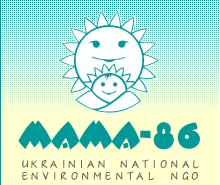Workshop “East-West Environmental Partnership:
European Strategy for EECCA”
Organized by MAMA-86 with the support of NOVIB January 23, 2003, Kyiv
Findings
Background
Within the framework of preparation to the Fifth Pan-European Ministerial Conference “Environment for Europe” Environmental Ministers from 12 countries of Eastern Europe, Caucasus and Central Asia (EECCA) gathered in April 2002 in Hague in order to discuss further joint actions for intensifying environmental reforms and strengthening positions of these countries in European and international cooperation. Adoption of a Statement of Intention to elaborate joint Environmental Strategy was the result of the meeting. A concept, structure and principles of the Strategy development were also agreed during the meeting. In accordance with the Ministerial Statement, the East-West Environmental Partnership and EU-EECCA Water Initiative, as components of the Strategy, were launched during the World Summit on Sustainable Development (Johannesburg, 2002).
Following the outcomes of the Hague Meeting, a Steering Group for Elaboration of the Draft Strategy was established. The Steering Group consists of senior officials from Ministries of Environment of partner states, representatives of international organisations and programs. In accordance with a decision of Tbilisi Meetings and a session of the Working Group of Senior Officials (WGSO), the draft Strategy elaborated by the Steering Group should be submitted for consideration and adoption at the fifth session of WGSO that was dedicated to adoption of documents for the Kyiv Conference “Environment for Europe”.
National Discussions
Intense discussions of the idea of the Strategy elaboration in Ukraine continued during the period of handling the issue. Representatives of national government authorities, academia, and environmental NGOs repeatedly expressed, often fundamentally opposite, points of view on this matter. In general, such discussions have got entirely political nature and did not concern the concept, in particular the matter of numerous analytical background documents.
Role of the Workshop “East-West Environmental Partnership: European Strategy for EECCA”
Acknowledging the need to consolidate positions of stakeholders in Ukraine at the crucial stage of elaboration of the issue, the National Environmental Non-governmental Organisation MAMA-86 with the initiative and informational assistance of European ECO-Forum and financial support of NOVIB have organized and conducted the workshop “East-West Environmental Partnership: European Strategy for EECCA”. The core objective of the workshop is building a constructive dialogue in order to identify Ukraine's positions as for the future process of the East-West Partnership/Strategy development, and particularly, the EU-EECCA Water Initiative. Realizing debates stimulated by this issue, workshop organisers did not set as an objective elaboration of the common position, but rather brining existent views closer through constructive discussion. The workshop was also aimed at conducting extensive debates of selected goals/elements of the Strategy, namely: Improvement of environmental legislation, policies and institutions (goal 1); Natural/Water resources management in economies in transition (goal 3); Biodiversity conservation and protection of ecosystems (goal 4); and Democracy of environmental decision-making, providing information to the public, promoting environmental education (goal 7). In order to meet this objective, the organizers prepared large collection of documents (a list of disseminated documents is added in Annex 1).
Thirty eight representatives of government authorities, in particular, the Ministry of Environment and Natural Resources of Ukraine, Ministry of Economy and European Integration of Ukraine, Ministry of Foreign Affaires of Ukraine, State committees, academia, environmental NGOs, and experts of international organisations, and REC-Kyiv participated in the workshop.
Process of Discussion
Having examined a number of documents that represented the history of preparation and essence of the East-West Pan-European Environmental Partnership for sustainable development, the Environmental Strategy for countries of Eastern Europe, Caucasus and Central Asia, EU-EECCA Water Initiative, in particular, the draft Environmental Strategy for EECCA, the analytical background documents; and having heard position of Ministry of Environment and Natural Resources, informational reports on history of elaboration and principal points of the East-West Partnership and the Water Partnership, participants took part in the discussion of this issue.
In the course of discussion, certain positions were identified:
- A Strategy of Environmental Partnership “East-West: Environment without Frontiers” that will cover all 55 countries of UN ECE region should be submitted for discussion at the Kyiv Conference. Strategy should be implemented by means of Specific initiatives, such as water, energy, and mountain initiative, etc.
- Draft Environmental Strategy for 12 countries of EECCA should be elaborated and submitted for adoption at the Kyiv Conference.
- Hardly is it expedient to discuss the existent draft Strategy for EECCA under an Agenda of the Kyiv Conference. A revised document might be included in the list of additional documents presented at the Kyiv Conference and have a recommendation nature.
- Developments of the national environmental strategy, the Strategy for EECCA, and the Strategy for Pan-European region do not conflict with each other. These processes might be carried out in parallel and supplement each other.
- Existent draft Strategy and analytical documents should be used as information and scientific potential for partnerships implementation on different directions.
- Existent draft Strategy and analytical documents should be submitted to the official list of documents of the Kyiv Conference as type II
List of analytical documents (Annex 3)
Having examined certain chapters of the draft Strategy and analytical background documents the participants have positively assessed the work done on its elaboration and stressed the importance of its methodical value, but also the need for some revisions (propositions on revision are added, Annex 4). Analytical document on Democracy of environmental decision-making, providing information to the public, promoting environmental education (goal 7) has been presented so far only as a chapter on environmental monitoring and information and needs considerable revision especially in matters of public participation and decision-making on environmental matters. Ukrainian NGOs should contribute to the revision of this document and present it to NGOs and new REC for EECCA consultation on the East-West Environmental Partnership: Environmental Strategy for EECCA that will be held in February 2003 in Tbilisi and at the meeting of Working Group of Senior Officials.
It was a shared position that the draft Strategy is not adequately elaborated to be considered at the Kyiv Conference.
